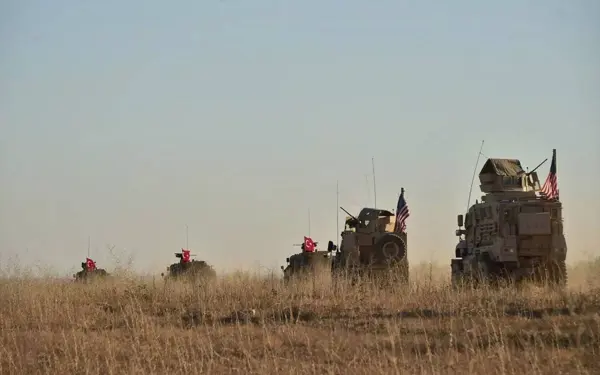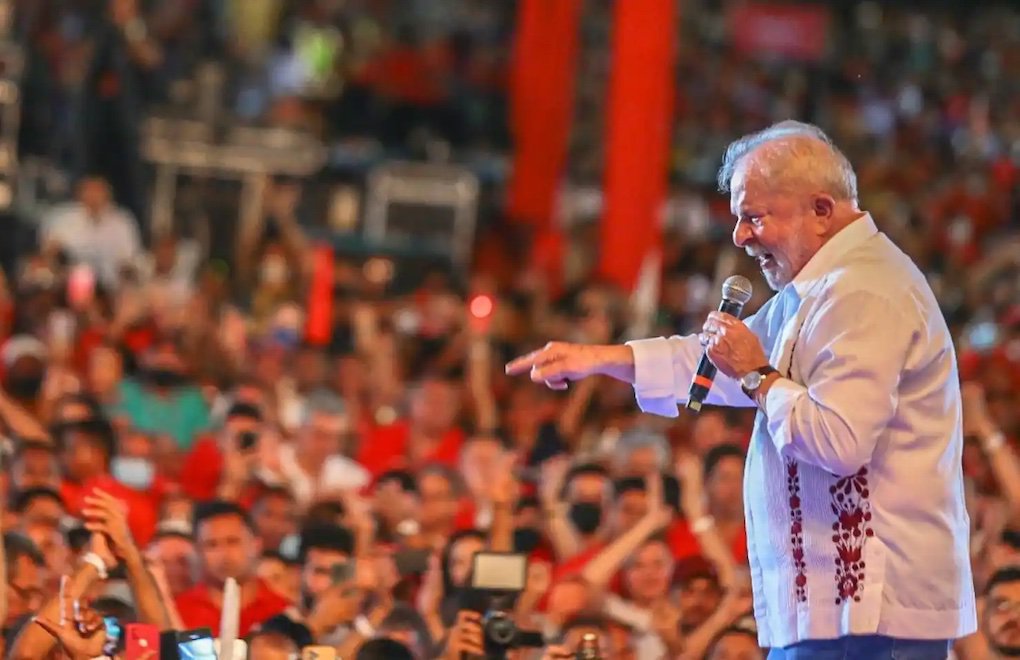Washingtons Preferences
Consecutive declarations of political positions by the Armed Forces Chief of Staff and top commanders could be read as a series of indicators for the public and international community. These indicators, for the time being, are not "Green" -or positive signs showing what is endorsed- but are "Red," indicating what must not be done:
* The military does not want to be ripped-off of its political mission and autonomy, and it does not want to hand-over the power to the government.
* The military does not want to see Recep Tayyip Erdogan at head of the state, as President.
* The military, in the West-Islam confontration, does not want to take part with the "Islamic Camp".
* The military does not want a solution to the Kurdish Problem through granting the Kurds community rights.
* The military does not want the roadblocks for freedoms of expression, criticism and organization lifted.
* The military does not want to adjust itself to the "Copenhagen Criteria", a precondition for European Union accession.
On the track of February 28 military intevention
As Prime Minister Tayyip Erdogan stepped on Washington to seek the support of George W. Bush for a solution to the Kurdish problem, Gen. Yasar Buyukanit, reuting the Prime Minister, publicly announced that there was a "fundamentalist" threat and that this existed at the highest levels of the Turkish state.
Despite attempts by the mass media commentators a day later to downplay Buyukanits statements that "it wasn't as harsh as expected", it is hardly likely that to interpret the outcry by Buyukanit and force commanders as an "expression of opinion" and treat it as ordinary.
Even though it is yet devoid of necessary strength and force major to be called a "Coup", one needs to be extremely gullible not to see that it is a challenge against the authority of the government, an attempt to draw a borderline against Tayyip Erdogan's ambitions to ascend to the head of the state.
General Yasar Buyukanit, while still the Land Forces Commander, had not hidden his dissatisfaction with with the policies pursued by the government on the Cyprus and Kurdish problem and had made harsh innuendos against the approach of European Union rapporteurs towards the Armed Forces. Without doubt, Buyukanit's approaches that voice the search for an "authoritarian democracy" and encourage ultra-nationalism is a direct reflection of his own line of thought.
Neverthless, the fact that like-minded officers who are in full agreement with Buyukanit on almost all major issues are appointed to the posts of high command should be read reflecting a ruling class/force preference than his own personal preference. Just like the overlapping of his predecessor Hilmi Ozkoks approaches towards European Union, compromises with Greece, remarks and approaches for a peaceful solution to the Cyprus question with that of the ruling classes.
It is more proper to see this latest drive of the Armed Forces, in the personality of Buyukanit, as a declaration of will on how Turkeys route -or that of ruling classes- should be determined under new global conditions more than the "army's ambition to rule".
There is no reason to doubt that the army will do everything within its hands in order to impose its preferences until when it is adopted by the ruling classes, as this gains the Armed Forces an even effective part in the regime, returning the army the momentum it achieved on February 28 and even further. Therfore, the personal preferences of Yasar Buyukanit, as long as they overlap with the preferences and concerns commonly shared by the armed forces, become the convition of the armed forces and start to determine the dominant equation.
The new global equation
The Armed Forces may have many traditional reasons against Tayyip Erdogans ascension to Presidency and the pressure coming from the EU for changing the part played by the army. Neverteheless, relating this opposition of the army, which is expressed in such severity, even to the degree of assuming the risk of isolation from the "West", to the issue of "fundamentalism" or Emine Erdogan's headscarf, is rather difficult, as there appears no logical connection between the cause and effect.
Yet when we read "fundamentalism" together with the global concerns in the background of Buyukanit and force commanders statements, it is possible to see that in essence the army is concerned over the AKP's approach of being part of the USA's Greater Middle East Project in the identity of an Islamic country and that this approach will create the Republic breaking off from the westernization perspective.
Further than this, in the equation of the new global force, the view that the European Union's capacity of playing a determining role is getting narrower by the day, the foresight that the world is being re-arranged under the USA-China polarization and that one need not unnecessarily offer a chicken where one cannot get a geese back in return is a view that is increasingly spreading in armed forces circles.
When the feeling that in the axis of France-Germany in the European Union Turkey's EU membership is becoming a more distant possibility and a possibility that is not desired is added to this, in the context of new global tensions, there is no fundamental strategic reason left for the armed forces to count themselves as being bound by the EU norms.
Another important strategic reason that has brought the Armed Forces to the point of zero-tolerance to an Islamic President is the USA-Iran nuclear tension and the risk of the division of Iraq. The Armed Forces which sees Iran's nuclear capacity as a strategic threat is sure that due to its Islamic world opinion the Tayyip Erdogan government does not gather the importance of this threat and does not see the role that Iran is playing in the region.
The Armed Forces are certain that the government has no strategic plan in view of the possibility of the division of Iraq. In reality, the force that holds all of these plans in its hands and that has been monitoring and preparing for this period does not want to go under the legal command of a Presidents whose strategic and political approaches it has no respect for and expresses these in a series of codes.
Fighting for USA support
The AKP does not fail to understand the requirement of this new strategic approach. It is because of this that the government has slowed down the EU accession talks process and pushed it to the back of the agenda, that it is reserving the least of its energy to this field, why Tayyip Erdogan rished to Washington to ask Bush for support against terror and why Bush himself behaved as if he was giving this support.
It is because of this that Yasar Buyukanit and all other force commanders have made so many unsupported salvos against the EU, imperialism, international capitalism, uncontrollable globalization but aside from these have not uttered a single word on the USA, the Bush administration or the USA foreign policy.
No matter what has happened in the past, even if its own [armed force] members have had sacks put over their heads, for even the most courageous armed forces it can be nothing but a frightening nightmare not to have a NATO umbrella and have to come face-to-face with a world that is being determined by China-USA, West-Islam polarization, with its nuclear Iran, an Iraqi Kurdistan that extends into a sixth of its own population, Al-Qaida terrorism that has the potential of having a militant in every mosque.
Labor demands outside of ruling agenda
It is difficult to see at the time being what the consequences of this tension will be. Possibilities include Tayyip Erdogan and his AKP realizing that they are losing public support and electing to lower the tension or continuing their insistence on Cankaya [the Presidency] and increasing the tension.
Which route Erdogan will elect is to be determined by the power struggle in the AKP and of course on which horse Washington will chose to bet on in the power struggle between the AKP and the armed forces.
USA ambassador Ross Wilson's reference to the threat of fundamentalism stressed by the army as being a flash in the pan does not mean Washington has made its choice in favor of the USA. It will be possible to see this more clearly after Yasar Buyukanit's visit to the USA.
But this conflict and the conditions that determine this conflict are creating no other result but to drag the demands of labor and the labor agenda under the shadow of the agenda of the ruling force. Despite all the comparisons between patriotism and treason, the palavers of fighting against imperialism, there is no reason to be a side in the conflict of those forces who cannot play their power struggle anywhere else but on Washington's chess board, who cannot think of any concept of international solidarity but for NATO, who in no way include freedom, peace and the rights of labor in their conflict.
In this period of tension, the only positive development that has widened the area of maneuverability for labor is the PKK ending its armed attacks for an indefinite time. This way the death of ordinary soldiers which have dragged the society and its intellectuals to the influence zone of ultra-nationalist agitation has been stopped.
For the time being it is not important whether this cease-fire is lasting or not and what its long-term impacts will be. What is important is that until April 2007 the opportunity of provocation has been taken out of the hands of the nationalists.
In this era of tension, the agenda of laborers and revolutionaries is not which ally of the USA will rise to the head of state, but to deepen the ideological and political struggle to protect their gains within this state's domination and going beyond the nationalist-Islamic polarization, to create the third pole, the pole of labor. (EK/II/YE)
The long and hot summer ahead

'Shamelessness'

LEFT TIDE IN LATIN AMERICA-III
The new task: 'To contribute the reintegration process, to recover the lessons of the Cuban revolution'

LEFT TIDE IN LATIN AMERICA-II
An International to accompany the continental rise of the Left

LEFT TIDE IN LATIN AMERİCA-I
David Adler: "A new vision that is feminist, ecologist, and pluralist"





